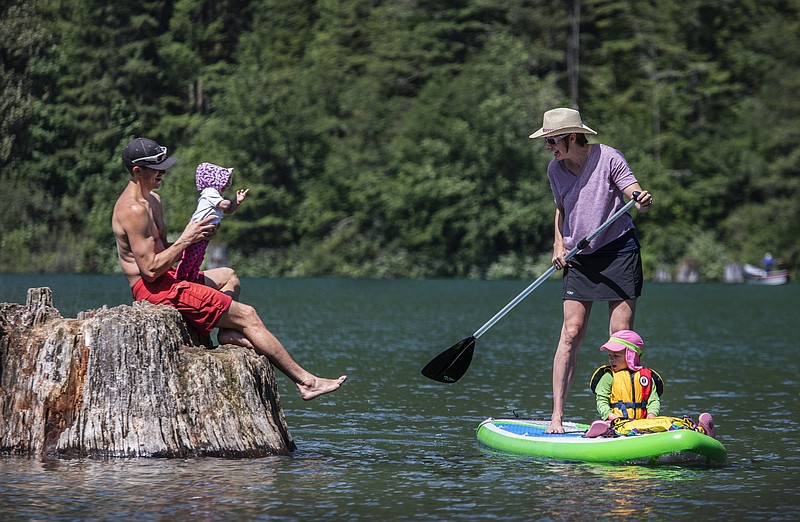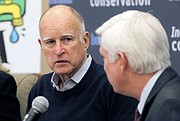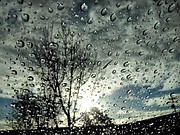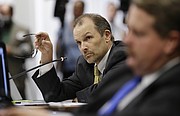SEATTLE - Like most outings with a small child, taking a 13-month-old to the rock-climbing crag requires extra preparation.
First of all, you need at least three adults in the rotation - one who's climbing, one who's belaying and one who's on baby-watch duty.
And, of course, in addition to your own climbing gear and sustenance, you have to pack in toddler snacks and water, and some form of kid distraction. One trick: Shiny carabiners and quickdraws make great baby rattles.
All of this is standard protocol for Brittany Aae (pronounced "Ah"), a dedicated ultrarunner, rock climber, backcountry skier - and mother. Aae, 31, was living out of her Subaru in the Methow Valley when she found out she was pregnant. That was a surprise.
But everything else leading up to the May 2016birth of her daughter, Rumi (pronounced "roomie"), was highly scripted. Aae kept an intense training regimen, skiing steep couloirs in the North Cascades at five months with her pants unzipped, running a 30-mile week leading up to the birth, and going into labor at the climbing gym.
All that training paid off after Rumi's birth, Aae says. The self-employed endurance coach, who's writing a book about pregnant athleticism, returned to the climbing gym three days later and resumed running the day after that. Now, she's back to climbing big alpine routes in the North Cascades and is working to establish a 50-mile running loop in the Pasayten Wilderness this summer.
Chatting over coffee and pastries at a Seattle cafe this spring, Aae is quick to acknowledge that, depending on the individual circumstances of pregnancy and birth, other moms will need more time to return to their prepregnancy levels of physical activity - and some might decide not to do that at all. Aae, who describes herself as an "academic feminist," never wanted motherhood to be the single thing that defined her, she says, and she offers zero apologies for her life choices.
"I don't want to sit around at some mothering group and stitch 'n' bitch about how much I hate my boobs after having a kid. I'm not interested in talking about the contents of her diaper. Some moms are, and that's healing and fun for them, but I'm not them," she says, pausing to take a bite of her gluten-free bakery bar. "People finally stopped inviting me."
Among our generation of young women, motherhood is becoming more of a choice than an expectation. And it takes many different forms: Moms can be single or partnered, breadwinner or homemaker, helicopter or free-range. And increasingly, they can also be ultra-runners, extreme skiers and mountain guides.
But endurance sports and alpine climbing aren't like most other hobbies: They require an intense dedication of time, mental energy and physical effort. And the outdoor industry isn't exactly known for showcasing the experiences of female athletes, let alone mothers - although that is changing.
Earlier this year, the overabundance of "male heroes, male voices and male sensibility" in the outdoor-recreation narrative prompted REI to launch a brand campaign called Force of Nature that showcases the experiences of female athletes. Through the rest of 2017, the Kent-based co-op has committed to using female faces and voices across all its social accounts, and to donating $1 million to nonprofits that create opportunities for women outdoors.
Although spending time outside is a challenge for parents of all genders, Laura Swapp, a marketing director at REI, says traditional child-care roles create a double standard when it comes to how mothers spend their spare time.
"It's not unlike the parallel of working mothers," says Swapp, who is a mom to two teenagers. "Women, if they are assuming more of the parenting responsibility, are going to be hit by more of the double-bind."
As a female climber who lives for weekends spent above tree line, I've often wondered to myself: Is my alpine life on the same timeline as my biological clock? If I have kids, will I limit myself to hiking Mount Si with a child carrier for the next decade or two?
Do the mountains come with their own glass ceiling?
In female athletes' quest to oscillate between climbing big mountains and tending to tiny humans, Margaret Wheeler's Instagram feed is the yin-and-yang blueprint. In one photo, she's leading a group of clients on a ski tour through Italy's famous Haute Route. A week later, she's lounging in a sunny meadow in Chamonix with her toddler daughter. Throughout, her photos are captioned with hashtags like #ohtheplacesyoullpump and, on a particularly deep powder day last spring, "Pumping while it's dumping."
Wheeler, 43, is one of the top alpine guides in the country, having served as an instructor-trainer for both the American Mountain Guides Association and the American Institute for Avalanche Research and Education. She calls Snoqualmie home, but since 2010, she and husband Matt Farmer, also a fully certified AMGA guide, have spent a good chunk of each year living and working in the Alps and the Dolomites.
Wheeler returned to guiding eight weeks after her older daughter was born in 2014, alternating work and child care with Farmer. But the birth of daughter No. 2 last December has added new challenges. For the first time since becoming parents, the couple didn't relocate to Europe for the spring ski-guiding season, deciding instead to rent a house in Ketchum, Idaho, and enjoy the area's Nordic trails while carrying their newborn in an Ergo and towing their 2-year-old in a convertible Thule trailer.
In general, Wheeler says it has been more difficult to get back into guiding this time around. But the family is now in the Alps for the summer climbing season, with Mom and Dad alternating work trips and family time, and Wheeler focusing more on "pick-up work" that will enable her to be home with her daughters at night. When we checked in the day before their flight, Wheeler was researching how much frozen breastmilk and dry ice she could take with her on the plane
She's got the mobile-feeding part down (ask about the time a male guide mistook her electronic pump for an oxygen tank), but it's the mental aspect, she says, that's most difficult - especially with a new baby.
"So much of your brain - I swear to God, it's just biology - is obsessed with the survival of that little human," she says.
Wheeler and Farmer are finding fulfillment in the parallels between climbing and parenting: the new environment, the uncertainty, the challenges you can't possibly foresee until you're staring them in the face.
"There's this whole volume of the universe that doesn't exist until you have kids," she says.
One of the first things you notice about Becca Cahall is that she's ripped. Bending down to adjust the seat of her 5-year-old's mountain bike at Issaquah's Duthie Hill Park, the Seattle mom's sculpted shoulders and biceps are a testament to the physical activity she gets in-between working full-time and raising two sons.
Cahall, 40, and her husband, Fitz, run an outdoors-focused branding agency called Duct Tape Then Beer and produce The Dirtbag Diaries podcast. She says parenthood has brought big changes to their lives.
She doesn't get out alpine climbing as much as she used to, mostly due to the amount of time required for big, all-day expeditions. Before kids, it was totally cool not to get back to the car until 11 p.m. or midnight. But now, things are different.
Cahall stayed active during both of her pregnancies, completing the 200-mile Seattle to Portland bike ride in a single day when she was four months pregnant with her first son, Teplin, and climbing well into her second pregnancy with Wiley, who is now almost 2.
After Teplin was born, however, she was surprised to find that her desire to get out in the mountains took a sharp dip.
"There's something very strong about the hormones that are going through your body, particularly in the first six months after you have a baby. And those hormones are telling you to be with your child, and to meet your child's needs," she says. "At first, I was like, I'm cool; I don't need to go do this stuff anymore.' "
Walking away was easier after her second baby, but it still took persistent pushing from Fitz. As Becca takes laps with Teplin around Duthie Hill, Fitz chases after Wiley and reflects on the gender dynamics of co-parenting.
Becca, he says, works harder; puts more thought into the lives of their sons; and is the one left in charge while he travels for work, which can be for up to 10 days at a time. But even with a really involved dad, Fitz says, "It's never a true 50-50 split." Kids demand more from Mom, especially when they're small, he says, and mothers are faced with more outside expectations.
"There's a lot of pressure on moms in a lot of different ways," he says. "Even with being really cognizant of that discrepancy, the only way to really end it is to kick Mom out the door."
Aae is no longer romantically involved with Rumi's dad, Ryan Audett, but the two live near each other in Winthrop and share custody. She and Audett have had many conversations about what makes for an equitable parenting split. After Rumi was born, Audett put in a lot of time with the baby so Aae could get back into training. These days, Rumi regularly accompanies Mom to the climbing crag or on short hikes, but Aae also is frequently on her own for several hours at a time, when Rumi is with Dad or a sitter. Later this summer, Aae will leave for a four-day climbing trip in the Picketts, a remote, rugged part of the North Cascades that contains some of the range's most difficult peaks.
Part of the struggle for new moms, Aae says, is the long-held assumption that caring for a young child is primarily a woman's responsibility, and that mothers who leave to pursue their own desires are "bad moms." Even in the ultra-conscious Methow Valley, Aae's female friends will say their male partners are "baby-sitting" so they can get out climbing without the kids. And people still tell her, "Oh, you'll stop" climbing eventually - an assumption that someday her passion for the outdoors will run its course.
"I love my child - it's clear," Aae says. "But I also love myself. And you can't give from an empty well."
Outdoor activities were always a family affair for Raquel Gaston, who grew up traveling through the Pacific Northwest in a trailer with her parents and siblings. She started backpacking as a teenager and progressed to climbing in her mid-20s after taking a course with the Washington Alpine Club. A couple years later, in 2007, she became pregnant with her son, Gabriel.
They hiked together from the beginning, starting with Gaston hauling Gabriel in a carrier as a baby and gradually working their way up to multiday backpacking trips as he was able to walk longer distances on his own. Now 9, Gabriel loves all things outdoors and is especially fond of skiing, his mom says. The duo even went out on low-key backcountry ski tours last winter at Mount Rainier and Blewett Pass.
In the meantime, Gaston, 37, has continued to hike, ski and climb on her own. She and Gabriel's dad share custody, and she uses her kid-free weeks to push herself on challenging peaks. On some of those trips, Gaston says, motherhood has made her re-evaluate whether going for a summit in iffy conditions or skiing a certain slope is worth it. But it's also encouraged her to be more vocal with her climbing partners about her concerns.
"I have a high risk threshold. I'm willing to take some chances," she says. "I definitely feel like that has enabled my voice to be a little stronger."
Risk has made Olivia Race, a 41-year-old Leavenworth mountain guide and mom of two, more selective about the trips she goes on. When she had her first child at age 35, Race and her husband, who are both fully AMGA certified, were guiding at least 200 days a year. Recently, she's been more focused on the business side of the couple's guiding service, Northwest Mountain School, as she recovers from an injury sustained on a ski guiding trip last winter.
In 2014, one of Race's friends, also a mother, died in an avalanche. It was a reality check, especially because the friend wasn't a big risk-taker.
"She was doing everything totally reasonably," Race says. "Sometimes it just goes the way you don't want it to go."
Women and the outdoors are having a moment. From REI's Force of Nature campaign to the viral "Where the Wild Things Play" video released by Seattle-based retailer Outdoor Research, a lot of conventional ideas about gender and the outdoors seem to be on their way out the door. Pair that with an emerging fixation on active pregnancy, a la Serena Williams, and you might end up concluding it's really no big deal to have a baby and continue to do all the things you did before.
But that perception can put women in a tricky place, Cahall says. The notion that moms have time to do everything - and do it at the same level they did before kids - presents an ideal that can end up more harmful than helpful.
"It's OK that things change - motherhood should change you. Hopefully, that's part of the joy," Cahall says. "I feel like I've learned as much about myself as I have my child in these first five years of motherhood."
Gaston shares a similar ethos, saying the excitement in getting outside has largely shifted to watching her son fall in love with the same places and activities that she cherishes. What would be helpful, she says, is more levelheaded advice about getting outside with kids and a general understanding that it's not any more challenging than, say, "running around to four different soccer games on the weekends."
Aae, who is active on social media and faced backlash for her slim figure during pregnancy, says it's important to tread lightly and not invalidate other women's experiences.
"I'm simply seeking to expand what we think of as an allowable norm," she says. "For me, the point isn't telling people they should be running long distances or climbing, but that they can, if they want to."
In Race's experience, life as a parent has led to new appreciation for activities that are easier to do with kids in tow, like rafting, biking and surfing. But climbing and skiing are still very much a part of her life, and the alpine isn't something she plans to give up.
"It brings so much richness to your life," she says. "It's hard to imagine living without it, too."




